Rise Above Read online
Page 3
***
It took him a moment to recognise the scent, or even to notice that it was there; a breath of lavender suffusing the air as it does when sun warms the heathland. There was no musk in it; it didn't hang heavy in the air, cloying, as women's perfumes usually did. A point in her favour, he thought; not that there were many.
"You have no children?" he asked.
"No," the woman answered. "They say that is god's curse on me."
Her voice was softer than he'd expected, and hesitant.
"I doubt god is so specific in his curses. He is merciful, and slow to anger."
A glimmer of a smile flickered on her face, but her eyes were still sad.
"No children. Yet the marriage was consummated?"
She nodded, silent. He sighed.
"If there were any doubt..." If there were any doubt, any doubt at all, he would be able to grant her an annulment. It would not be popular with her husband's friends at court, but he could defend the decision; it would be correct in canon law. Venetia Mountjoy might or might not be in love with Robert Pendlebury, as some said she was, but that had, or at least, should have, nothing to do with the case.
"And you are not alleging adultery?"
"No."
She spoke carefully, as if she had had to think a long time before making that decision; and it was, perhaps, a surprising one.
"You know, don't you, that..." He wondered how to put it most kindly.
"Lady Favell? I know. And yet... I may not love my husband, but I would not see him shamed."
"In any case, I could not grant a divorce on those grounds; not as things stand currently. The Reformed church in the Netherlands, you know, has argued for it, but I cannot be any comfort to you on that point."
He wondered why she did not help herself by telling that little lie about consummation; it would be so easy. Such a gossamer light lie, that could be brushed away from her conscience; so many women would have taken that course. Delicacy held him back from suggesting it, but he still asked; "You are sure that the marriage was consummated? You understand fully what you are saying?"
She blushed, and looked down, silent. He noticed how long, how dark her eyelashes were against her skin.
"Marriage," he said - wondering as he said it what he knew about it, how he was supposed to know – "marriage is not a sacrament, you know."
"I know. Not according to the Puritans."
"Not according to the established doctrine of the Church of England." She looked up, startled at his asperity.
He hadn't meant to be so testy. He spent too long closeted with other men, dealing with the recalcitrant and the theologically unsound, in the thickets of disputation, and God knew (God did know, he was sure) that it was easy enough to lose oneself there, to lose sight of the golden Jerusalem that shone in the distance, to see only the trees and not the way out of the wood. God's grace was free and abundant, and yet faced with a curate who could not grasp the basic tenets of predestination, or a recalcitrant who would not give up praying for departed souls, he would get drawn into argument time and time again, and found himself far from the Biblical charity he wished he could more often profess. Then again, when he did manage to moderate the strictness of canon law, he felt sickened and guilty, as if he had given something away that wasn't his right to give. The archbishopric should have gone to someone more suited to judgment, he thought; a judge and a scholar were two different things. (And who was he to judge, anyway?)
"Not a sacrament." She was prompting him, he realised; he must have drifted off. He was prone to do that, these days; it was not age, but an increasing lack of interest in his work, perhaps, that had led him to it.
"No, not a sacrament. But even if not a sacrament, marriage is in a way sacred; husband and wife must cleave to each other like Christ and his Church. It must be a binding of souls as it is of bodies, or it is of no worth."
She shook her head. "It never... I ….no. It was never like that."
He bowed his head over his steepled fingers. He wondered if her husband was as glib a liar as she was tongue-tied by honesty; if that was what lay behind her reticence, and he thought it was.
"Then yours is no true marriage."
"Then..." Hope gleamed in her eyes for a moment as she looked up at him, surprised by his tone.
"I believe it is no true marriage. But within the laws as currently constituted, there is nothing I can do."
She bowed her head again. Then she seemed to reach a decision, for she looked up at him, and all the lines of her face had hardened.
"The King will not be pleased," she said.
He knew this. Mountjoy was a past favourite; Pendlebury the coming man, new at court, and the King wanted him firmly tied to Venetia's interests in the North. No, he knew the King would not be pleased, any more than his predecessor the great Henry had been pleased with any restraints the Church had put on his own marriages, or the ending of them.
"No," he said, "I understand that."
"You would stick to your decision in the face of royal displeasure?"
"Yes."
She nodded. "Honesty is... not comfortable, I know. I have good reason to know."
She did not stay long. The scent of lavender lingered on the air, and he wondered quite what she had meant, what she had expected; whether she'd thought he would cave in to that crude threat, and why she couldn't tell the one simple lie that would have made everything easy. Perhaps, he thought, he might have loved such a woman himself, if he had ever found one.
Had it, after all, been a threat? There was something in her behaviour that he couldn't satisfactorily explain; as if she were positively glad that he would not grant her request. There was some deep reserve in her that mystified him.
Well, he'd made an enemy of the King. Over such a small thing, too. Not over the future of the English Church, not over the independence of the universities, not over freedom of conscience; but simply over a marriage. (True, Venetia Mountjoy was a Beaulieu by birth, and the Beaulieus were not a small thing; her grandfather, old Harry Beaulieu, bushy-bearded, a short man but as wide as he was tall, could silence a room with his shout, and when he talked quietly, men listened all the more intently. He was the most powerful landowner in the West and the borders, where rumours of recusancy and rebellion stirred every summer, like the roots of couch grass under the wheat fields; and no one knew, if it came to it, which side of the question he would take, for despite his powerful voice and his apparent frankness, he kept his opinions to himself.)
Well, other archbishops had made enemies of kings; Becket, and Cranmer, and Scrope... then he remembered what had happened to them, and pushed his shoulders up to his ears, shrugging into himself, making himself small as he'd done in bed, as a child, so the ghosts wouldn't see him and would pass by. The times have changed, he thought; these are not days when it's dangerous to be an archbishop. But he had unsettled himself, and during the afternoon court, his clerk had to remind him twice to deliver his judgment, when his mind had wandered.

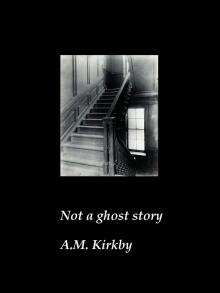 Not a Ghost Story
Not a Ghost Story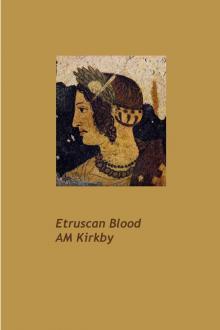 Etruscan Blood
Etruscan Blood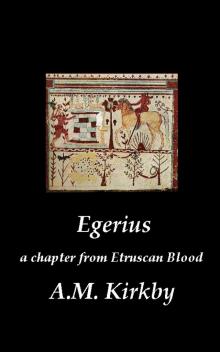 Egerius
Egerius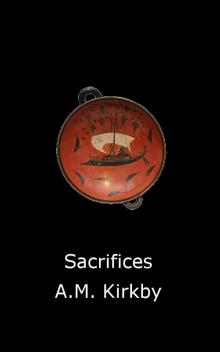 Sacrifices
Sacrifices The Tin Heart
The Tin Heart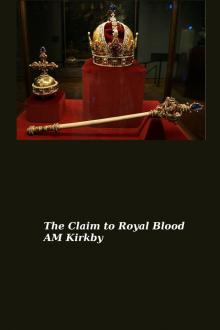 The Claim to Royal Blood
The Claim to Royal Blood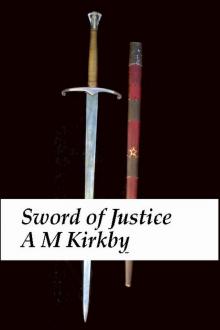 Sword of Justice
Sword of Justice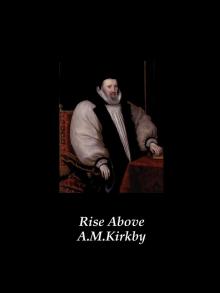 Rise Above
Rise Above